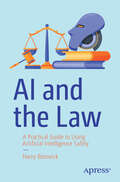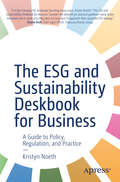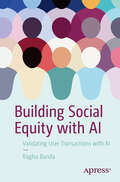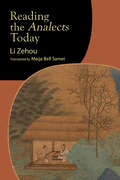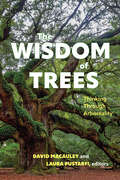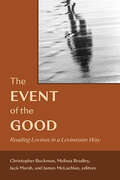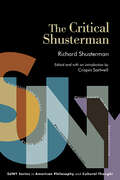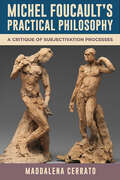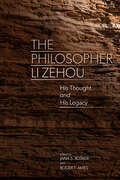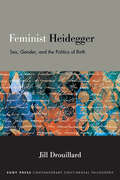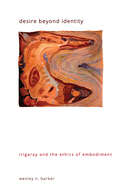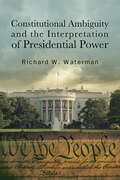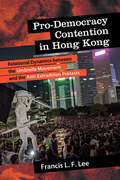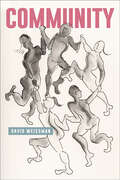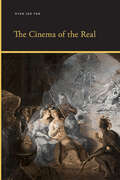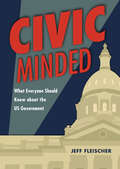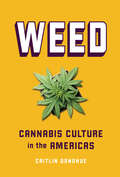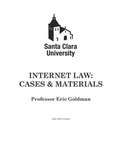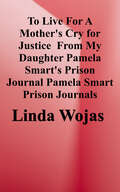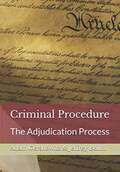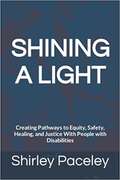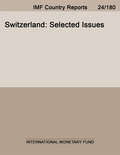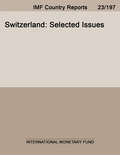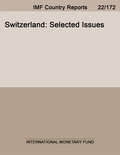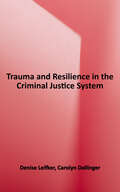- Table View
- List View
AI and the Law: A Practical Guide to Using Artificial Intelligence Safely
by Harry BorovickLearn how to maximize your use of, and benefit from AI, personally and professionally while staying safe. To satisfy professionals and businesses trying to modernize their approaches to work and personal tasks, this book will explain some of the basics of what AI is, what AI is likely to look like in the near future, and how not to get stung using it. You’ll quickly realize that AI isn’t coming, it’s here, along with its opportunities and challenges. While some of the advantages of using AI tools may seem too good to be true, you’ll discover that the key to navigating the early stages of the AI era is to understand its guiding principles and then to prioritize the guidelines. The book features general situations and use cases to help you experience AI for fun and for work while retaining the benefits, profits, creations, outputs, and efficiencies of it. If you’re going to use AI in your daily career, whether as a student, creative, executive, marketer or in sales this book will help you understand how to bypass obstacles and get value from AI with the guidance of an AI and tech lawyer. What You Will Learn Identify, debunk, and protect against business and legal risk in the AI eraDiscuss these issues on a high level with CTOs and COOsSee how professionals can mutually use AI to their benefit Who This Book is For Anyone who wants to know whether AI is really going to change the world through the lens of their industry, or to simply understand how AI can be safely harnessed to maximize daily value while minimizing practical risks.
The ESG and Sustainability Deskbook for Business: A Guide to Policy, Regulation, and Practice
by Kristyn NoethThe interest in sustainability and environmental, social, and governance (ESG) from stakeholders across all sectors is growing and will continue to do so as we are in the most pivotal decade for meeting the global goals on climate change and sustainable development. This book is a compendium of the international agreements, regulatory advancements, and current practicum to inform a 360-degree viewpoint of the organizations, frameworks, and stakeholders that shape the evolving landscape.Written in a straightforward and conversational tone, you’ll embark on a knowledge journey on the progression of ESG and sustainability and how it directly shapes and informs current practice. It provides insights, discussion, and topical briefings as a side-by-side reader to accompany the rise of ESG and sustainability in business and the markets. The flow of information and reader education begins with the origins of sustainability in international treaties and policy. It then moves on to theadvent and differentiation of ESG, sustainability, and social responsibility; provides substantive issue briefings on the key “E,” “S,” and “G” factors. You’ll continue by walking through the global regulatory and standards paradigms; delve into ESG ratings and indices; and examine in-depth analysis of the respective roles of the corporation, the financial and investment sector, the international bodies, the business interest groups, the NGOs and third-party organizations, and the philanthropic community. You’ll also see that corporations and investors are advancing ESG and sustainability strategies and programs at a record pace. What were once regarded as “nice-to-have” initiatives with voluntary reporting have moved into the regulated sphere with mandatory public disclosures and reporting requirements on greenhouse gas emissions, climate risk and transition planning, biodiversity and nature-related impacts, supply chain transparency, anti-bribery and corruption, humanrights, human capital, and board diversity. The ESG and Sustainability Deskbook for Business threads the needle with best practices, case studies, and takeaways to illustrate the applications and to enhance understanding.What You Will LearnStudy the progression of ESG and sustainability and how related considerations increasingly drive business, policy, and economic decisionsReview Takeaways and best practices to provide insights and discussion pointsUnderstand the critical differences between ESG, social responsibility, and sustainabilityWho This Book is ForESG and Sustainability Practitioners (across all sectors), Corporate leadership, Tech sector (a key growth area for compliance, reporting, and GHG accounting), Investors, Compliance, risk, legal, and corporate governance professionals, Management and board consultants
Building Social Equity with AI: Validating User Transactions with AI
by Raghu BandaDid you ever think that the way you interact with other human beings, entities, and organizations can be measured for building a harmonious society? In this age of user verification and user validation, AI will fine-tune these interactions and transactions to build a socially equitable world. This book reveals that social equity is not only what you get from society, but also what you give to it. You’ll explore the concepts and intricacies of this mutually built phenomenon. The book then and focuses on creating social equity awareness and details how AI can help in the process. Regular enterprises, consumer-oriented companies, and social media companies all capture data in regular interactions and use this information in various ways. You’ll learn how this information is being leveraged and explore how social equity can thrive when all this information is analyzed and measured.Building Social Equity with AI highlights the subtle nuances of social equity and howAI can create more awareness towards it, thus improving your business or organization.What You’ll LearnUnderstand how social equity affects all business and industry professionalsBuild social equity into a changing worldSee how AI and GenAI stand out as transformative forcesIntegrate social equity into network structuresAddress equality and equity in the context of people, processes, and technologyWork with AI to improve social equity scores Who This Book Is ForSmall-medium business owners and users, consultants, education specialists, career coaches, data engineers, and social workers who want to leverage AI to gain social equity for either their business or personal life.
Reading the Analects Today (SUNY series, Translating China)
by Zehou LiOne of China's most prominent contemporary philosophers reads and comments on one of the central texts in the Chinese philosophical tradition.In this book, one of contemporary China's most prominent philosophers, Li Zehou, explores one of the central texts in the Chinese philosophical tradition, the Analects of Confucius. While the book provides an introduction to the Analects itself and to Confucianism in general, it also serves as an introduction to Li's own thought, particularly the ways in which he regarded the Confucian tradition as relevant to postrevolutionary contemporary China. Key topics include the role of Confucianism in the Chinese tradition and in contemporary China; Confucianism's quasi-religious, quasi-philosophical character; Li's views on emotion, morality, and fate in Confucianism; and his call for a separation of public social morality from private religious morality in modern China. Translated here by Maija Bell Samei, Reading the "Analects" Today is among the most accessible of Li Zehou's works and will be of interest not only to philosophers but to scholars and students of both modern and traditional Chinese intellectual, social, and religious history.
The Wisdom of Trees: Thinking Through Arboreality (SUNY series in Environmental Philosophy and Ethics)
by David Macauley; Laura PustarfiPioneering essays that reveal the significance of new interdisciplinary understandings of trees and forests, especially in terms of their philosophical and ecological dimensions and their importance for addressing the climate emergency.This is the first book to apply philosophical thinking to trees. Through a series of sixteen diverse essays by leading scholars and writers, along with an in-depth introduction to the key issues and ideas, it examines the new and emerging understanding of trees in science and society. Contributors show how these developments encourage a revisioning of philosophical thought and a more sustainable relationship with trees and forests-a reconceptualization with important ecological and social implications for responding to deforestation, the loss of biodiversity, and the climate emergency. The interdisciplinary contributions in this collection investigate the many interconnected dimensions of arboreality, focusing on subjects related to time, mind, truth, memory, being, beauty, goodness, silence, wisdom, personhood, and death. The volume engages in a conversation about why trees matter, how they can best be protected, our obligations to them, and even what or who they are. Most of the chapters are informed by natural history or ecological science and many share a particular emphasis on continental philosophy and the environmental humanities.
The Event of the Good: Reading Levinas in a Levinasian Way
by Christopher Buckman; Melissa Bradley; Jack Marsh; James McLachlanCenters on the ethics of Emmanuel Levinas, aiming to understand this important thinker on his own terms.To read Levinas in a Levinasian way means to understand this important thinker on his own terms, thinking "ethics as first philosophy," without reducing his role to that of a contributor to some other discourse, such as phenomenology, deconstruction, or religious traditions other than his own. This volume offers a variety of interventions into how the priority of the ethical-as formulated by Emmanuel Levinas and seconded by Richard A. Cohen, one of his preeminent interpreters-reorients philosophy to its own questioning-indeed, to its very sense of itself as meaningful. In the decades since Levinas first emerged as a profound and critical voice, many have used his thought to illuminate a broad range of philosophical questions. Often this has occurred in ways that have deemphasized or altered what is arguably Levinas's most radical gesture: reframing philosophy, indeed reframing the meaning of meaning, via an ethical turn. To this end, the essays in this volume, drawing especially on Cohen's reading of Levinas, offer insights into how appropriations and assessments of his philosophy might become more in line with the urgency and full meaning of his notion of the ethical. Whether discussing ethics, aesthetics, politics, or Jewish thought, when taken together, they enhance our comprehension of ethics and Levinas's philosophy of responsibility.
The Critical Shusterman (SUNY series in American Philosophy and Cultural Thought)
by Richard ShustermanCollecting sixteen key texts on a broad range of key philosophical topics enables readers to perceive the scope of Shusterman's philosophy and appreciate its systematic aspects.Richard Shusterman is one of today's foremost philosophers. His influential and widely translated work is distinctive for its originality and its integration of multiple philosophical perspectives (analytic philosophy, phenomenology, hermeneutics, critical theory, and East Asian thought) to create a new transcultural pragmatist vision. Although most famous for his groundbreaking writings in aesthetics, somatic philosophy, and philosophy as an art of living, these texts are integrally connected with Shusterman's vital views on ontology, epistemology, and philosophy of mind, ethics, and politics. Collecting sixteen key texts on this broad range of topics, The Critical Shusterman enables readers to perceive the scope of Shusterman's philosophy and appreciate its systematic aspects. Editor Crispin Sartwell's superb introduction highlights those aspects in assessing Shusterman's thought in the context of contemporary philosophy while suggesting ways that Shusterman's project could be developed in the future.
Michel Foucault’s Practical Philosophy: A Critique of Subjectivation Processes (SUNY series in Contemporary French Thought)
by Maddalena CerratoOffers a holistic approach to Michel Foucault's thought, introducing the idea of practical philosophy as an original interpretative framework.Michel Foucault's thought, Maddalena Cerrato writes, may be understood as practical philosophy. In this perspective, political analysis, philosophy of history, epistemology, and ethics appear as necessarily cast together in a philosophical project that aims to rethink freedom and emancipation from domination of all kinds. The idea of practical philosophy accounts for Foucault's specific approach to the object, as well as to the task of philosophy, and it identifies the perspective that led him to consider the question of subjectivity as the guiding thread of his work. Overall, Cerrato shows the deep consistency underlying Foucault's reflection and the substantial coherence of his philosophical itinerary, setting aside all the conventional interpretations that pivot on the idea that his thought underwent a radical "turn" from the political engagement of the question of power toward an ethical retrieval of the question of subjectivity.
The Philosopher Li Zehou: His Thought and His Legacy (SUNY series in Chinese Philosophy and Culture)
by Jana S. Rošker; Roger T. AmesDeepens our understanding of this contemporary Chinese thinker's philosophy and its significance.Li Zehou (1930–2021) was one of China's most prominent contemporary philosophers, transforming Confucian philosophy into a resource for positive change. From a critical rereading of the Analects to a formulation of his own aesthetic theory, Li reinterpreted the tradition from earliest times down to the present day. In this effort, he was inspired by Marx and Kant but was neither a Marxist nor a Kantian. Nor was he a Confucian. He was, and remains, an original: the philosopher Li Zehou.In this volume, Chinese, European, and US scholars explore Li's contributions to Chinese philosophy and culture, deepening our understanding of his philosophy and its significance while also celebrating the intellectual diversity and richness of Chinese philosophical thought. In a passionate and dedicated endeavor to ensure that Li's philosophy endures and continues to inspire scholars, particularly the younger generation of academics, both in China and around the world, the volume aims to serve as a catalyst for ongoing scholarship and discourse on the work of the philosopher Li Zehou.
Feminist Heidegger: Sex, Gender, and the Politics of Birth (SUNY series in Contemporary Continental Philosophy)
by Jill DrouillardA feminist reading of how Heidegger may have responded to an unanswered questioned he posed in 1923, "Problem: What is woman?" while using his thought to better understand how contemporary society replies to questions in the realms of law, bioethics, pedagogy, and politics.This book begins with an unexplored and unanswered question that Martin Heidegger raises in a 1923 Freiburg course: "Problem: What is woman?" Yet, why should we care that Heidegger raises this "problem"? What could he, a member of the National Socialist Party, help feminists understand about responding to "the woman question"? How can Heidegger help us understand our own historical climate in which this question continues to hold significance? Jill Drouillard divides Heidegger's thought into two categories to think about the sexed/gendered experiences that coordinate our birth: (1) the one that suspends "the woman question" and that provides useful resources for thinking the fluidity of sex/gender, and (2) the one that provides a totalized reply to this query by manipulating tropes of the feminine to advance a politico-poetic project of Nazi politics. She uses Heidegger as a cautionary tale to demonstrate the harm that occurs when society tries to define the being (or "what is") of woman in any definite sense. In some chapters, she teases apart how Heidegger may have offered a reply to "the woman question" and, in others, shows what happens in today's society when law, bioethics, politics, and pedagogy reckon with this query.
Desire beyond Identity: Irigaray and the Ethics of Embodiment (SUNY series in Gender Theory)
by Wesley N. BarkerCritically adapts the notion of desire in Luce Irigaray's philosophy to rethink the role of embodiment in sociopolitical and philosophical discourses today.Arguing for a radical return to desire in Luce Irigaray's thought, this book decisively intervenes in impasses around questions of identity that continue to confound contemporary discourse and politics. By prioritizing the disruptive potential of desire rather than sexual difference, Wesley N. Barker extends Irigaray's relational theory of becoming into new territory, opening generative, often surprising pathways for conversation with philosophies of race, queer theory, political theology, decolonial theory, and posthuman thought. As a source for reimagining materiality, desire is pulled free of a phallocentric, white, colonial framework and mobilized toward a philosophy of living capable of addressing the twenty-first century's multifaceted crises of identity, representation, and embodiment.
Constitutional Ambiguity and the Interpretation of Presidential Power (SUNY series on the Presidency: Contemporary Issues)
by Richard W. WatermanExamines the role of constitutional ambiguity across the entire spectrum of American history and how it impacts our interpretation of presidential power.While the rise of autocratic presidential powers has been widely noted by scholars in recent years, with calls by some for a stronger or more accountable presidency, Constitutional Ambiguity and the Interpretation of Presidential Power is among the first entirely dedicated to a study of the impact of this ambiguity on how scholars, judges, and presidents have understood executive power. Embarking on a detailed examination of legal, historical, and political science literature across the broad scope of American history, Richard W. Waterman examines the concerns of the Constitution's Framers regarding the fear of monarchy and a tyrannical president. He then discusses the writing and ratification of the Constitution and by drawing on insights from the time of the Framers to the present day, he provides a unique historical timeline related to the discussion and analysis of constitutional ambiguity. Over the course of several chapters, he finds that no sole theory defines presidential power, and ambiguity rules the day, allowing presidents to find power in the Constitution's silences as well as its various nooks and crannies, which has led to the very real danger of an autocratic presidency.
Pro-Democracy Contention in Hong Kong: Relational Dynamics between the Umbrella Movement and the Anti-Extradition Protests (SUNY series in New Political Science)
by Francis L. LeeElucidates the political dynamics that link the Umbrella Movement to the anti-extradition protests and helps explain the key character of the latter movement.Presenting an analytical account of the relational dynamics linking the 2014 Umbrella Movement and the 2019 anti-extradition protests in Hong Kong, Pro-Democracy Contention in Hong Kong aims to explain not only the relationship between two spectacular protest campaigns but also why the anti-extradition protests exhibited a high degree of internal solidarity and public sympathy toward confrontational and at times violent protest actions. The analysis moves beyond the typical focus on the peaks of social mobilization to examine the contingent and dynamic evolution of the pro-democracy movement in Hong Kong. Drawing upon a range of research materials, including in-depth interviews with protesters and leading activists, surveys of protesters conducted onsite, population opinion surveys, systematic analyses of media materials, and examination of the verdicts of protest-related court cases, Francis L. F. Lee offers theoretical insights on various important issues in the study of social movements, including, among others, the possibility of movement transformation during abeyance, the relationship between protest events and elections, the role of ideological brokers in movement dynamics, and the nature of spontaneous protests. Readers interested in Chinese and Hong Kong politics or interested in social movement studies and analyses of political dynamics in hybrid regimes will find value in Lee's analysis.
Community
by David WeissmanCommunities are vital to personal and social well-being because collaboration is required where skills and resources are scarce; their pathologies—anonymity and isolation, tribalism and murder—defeat us.Community is often invoked respectfully but without a clear referent. The word is said to be used ninety-four ways, evidence that its sense is diffuse. Community clarifies the word's principal expressions and the alternative ideological spaces-holistic and hierarchical or open and tolerant-in which communities form. Members bind in the interest of utility-jobs or schools-or because home and friendship are the focus of feeling and significance. These binders are social glue: they explain our dedication to communal aims and loyalty to fellow members. Autonomy in their context is socialized; its bases are the information, attitudes, and skills acquired when families and schools prepare us for roles in communities inherited or chosen. Yet community is fraught. Holistic societies are repressive; open societies are vulnerable. The members of successful communities-families, businesses, and schools-often thrive. Those excluded for want of luck or skill are abandoned and anonymous. Their isolation is one of an open society's two pathologies: collaboration is a social necessity when resources, space, and skills are scarce; competition turned visceral and murderous is a vice.
The Cinema of the Real (SUNY series, Insinuations: Philosophy, Psychoanalysis, Literature)
by Hyon Joo YooA significant intervention into Lacanian film studies, this book sets forth a new theory of the psychoanalytic Real in cinema. In psychoanalysis, the Real ruptures the Symbolic that organizes law, ideology, and other systems of belief, revealing fissures in this underlying order. The Cinema of the Real explores how transnational cinema and especially South Korean cinema facilitate an encounter with the Real, enabling the emergence of a new political subject. Paying close attention to form, Hyon Joo Yoo reveals the existence of an "emancipatory drive" in films by Jang Hun, Park Chan-wook, Lee Chang-dong, Jia Zhangke, Michael Haneke, Claire Denis, and Bong Joon-ho, among others. Their work in effect provides viewers with a picture of how it looks and feels to be on a trajectory in which the subject and her world can change. Far from being a passive consumer of images, Yoo's spectator enters the space of the Real. Theoretically rigorous and inventive, The Cinema of the Real offers new, transnationally attuned tools for conceptualizing the body, affect, femininity, and spectatorship, as well as fresh readings of both classic and contemporary films.
Civic Minded: What Everyone Should Know about the US Government
by Jeff FleischerHow do student loans work? What do sanctions do? Where does federal spending go, and who decides on the budget? Author and established journalist Jeff Fleischer digs into these and other relevant civics topics to explain the history behind different processes and programs, what they look like today, and why it’s important to understand them. Through engaging, well-researched text and related sidebars, this book will help you understand and join many ongoing political conversations in the US, from spending to citizenship to international relations and more.
Weed: Cannabis Culture in the Americas
by Caitlin DonohueHumans have used cannabis for thousands of years, since Neolithic peoples sought out its medicinal benefits. But for the past century, its use has been largely criminalized. Stigma around cannabis has made it difficult for people of all ages to get straightforward answers about how to minimize health risks related to cannabis consumption or to understand how the plant has shaped and continues to shape society today. In Weed: Cannabis Culture in the Americas, culture writer Caitlin Donohue crafts a comprehensive and thought-provoking review of cannabis in the Western Hemisphere. Donohue’s investigation spans from Vancouver, Canada, to Buenos Aires, Argentina, interviewing medical researchers, educators, activists, artists, business leaders, and other experts to explore the long relationship between cannabis and the human race, its almost universal prohibition in the twentieth century, and modern efforts to legalize the much-maligned plant in all its forms.
Internet Law: Cases & Materials
by Eric GoldmanThis is a casebook for students learning Internet Law, but other people interested in Internet Law may find it interesting. The book covers jurisdiction, contracts, trespass to chattels, intellectual property (copyright, trademarks and domain names), pornography, defamation and other information torts (including limits on web host liability), privacy, spam and the legal issues applicable to blogs and social media.
To Live For: A Mother's Cry For Justice
by Linda WojasOn March 22, 1991 after a 14-day trial in Rockingham County Superior Court, New Hampshire, my daughter Pamela Smart was wrongfully found guilty in the murder of her husband, Gregory Smart. She was convicted of being an accomplice to first-degree murder, conspiracy to commit murder and witness tampering. Only 22 years old at the time, she was given a life without parole sentence. <p><p>My daughter did not commit these crimes. I'm not saying this because she's my daughter, but there was no credible forensic evidence to prove she had any role in Gregory's murder. This trial spiraled into a media circus and the un-sequestered jury believed all the lies that the local news stations were saying about Pamela's role. Billy Flynn who testified at trial that he physically pulled the trigger, as well as testifying against Pamela at trial, he ended up pleaded guilty to second-degree murder. He was sentenced to 40 years to life, with the option to shave 12 years off if he behaved himself in prison. He was released in 2015. Flynn was 16 when he shot my 24-year-old son-in-law Gregory Smart to death, and accused Pamela of telling him to carry out this heinous act. <p><p>Nicole's Kidman's portrayal of Pamela's life in the cult film "To Die For" is just one example of the way the media has exploited her pain, our family tragedy. I've bottled up my feelings for 30 years now and finally decided to release personal and revealing letters between Pamela and myself, to share with the public so people can see the truth behind all the lies. This is the first journal I am releasing. We have lots more to come. <p><p>I will continue to fight for Pamela's freedom because she's innocent and has so much left of her life to offer society. I want her home before I die and will continue to file petitions to get the executive council of New Hampshire to free Pamela. This is my book. This is our story. This is what I live for.
Criminal Procedure: The Adjudication Process
by Jeffrey Bellin Adam GershowitzThis book is what you might think of as a Marie Kondo version of criminal procedure: happiness by decluttering. Many of the leading criminal procedure textbooks are crowded with pages upon pages of notes and unanswered (and sometimes unanswerable) hypotheticals. We understand this impulse. The field of criminal procedure raises countless interesting questions that scholars would love to explore in great depth. However, we do not believe that law school casebooks should be designed for scholars. Rather, law school casebooks are for students who do not yet have an elementary understanding of the subject. After all, that is why they are in the class! To use another metaphor, we intend this book to be about the forest, not the trees, so that students can see the big picture more clearly.This criminal procedure textbook is first and foremost designed to be accessible to students. How did we do that? First, we have largely eliminated notes and questions except where they directly reinforce the doctrine or where they eliminate the need to include a lengthy excerpt. For instance, the double jeopardy chapter does not have notes about fascinating (but esoteric) mistrial issues.
Shining a Light: Creating Pathways to Equity, Safety, Healing, and Justice With People with Disabilities
by Shirley PaceleyShining A Light is a powerful personal and professional memoir of one woman’s journey in partnership with other people with disabilities to find equity, safety, healing, and justice. Shining A Light confronts the oft-hidden issue of sexual assault against people with disabilities, including its alarming prevalence and insightful stories of resilience and hope. Chapters on education, trauma and recovery, criminal justice, and systems change Illuminate how service professionals can create authentic and healing relationships with survivors with disabilities and transform systems of service, healing, and justice. <P><P> Shining A Light clearly demonstrates the fact that sexual assault occurs within a context of power differences, and the reader gets to learn from the experts - people with disabilities. The lives of people with disabilities are illuminated through poignant stories of inequality and violence as well as stories of profound connections, speaking truth to power, and the capacity of dreams to change lives. <P><P> The reader discovers that as the author partners with others to heal from their trauma, she is on a parallel path to heal from her own. This epic book contains lessons learned and critical tips along with resources for survivors, family members, disability services, victim services, criminal justice personnel, counselors, sexual assault nurses, and others.
Switzerland: Selected Issues (Imf Staff Country Reports #Country Report No. 13/129)
by International Monetary Fund. European Dept.A report from the International Monetary Fund.
Switzerland: Selected Issues (Imf Staff Country Reports #Country Report No. 13/129)
by International Monetary Fund. European Dept.A report from the International Monetary Fund.
Switzerland: Selected Issues Paper (Imf Staff Country Reports #Country Report No. 13/129)
by International Monetary Fund. European Dept.A report from the International Monetary Fund.
Trauma and Resilience in the Criminal Justice System
by Denise Leifker Carolyn DallingerTrauma and Resilience in the Criminal Justice System will help criminal justice practitioners and students develop skills to be the most effective professionals possible by increasing awareness and pointing out places for empathy and change. Readers will examine the enforcement, court, and correctional systems to determine where trauma plays a destructive part. From the point of view of police, detectives, judges, jurors, attorneys, correctional and probation officers, prisoners, and others, the reader will learn the potentially harmful and sometimes devastating impacts of trauma. Readers will also learn from practicing criminal justice officials some potentially impactful actions they can take to build resilience. This book could lead to new perspectives and methods in improving the future of the criminal justice system.
